 |
 |
 |
 |
 |
 |
 |
 |
 |
 |
 |
 |
 |
 |
 |
 |
 |
 |
|
|
|
|
|
|
|
|
|
|
|
|
|
|
|
|
|
|
|
|
 |
|
 |
|
|
|
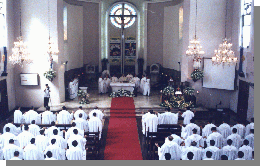 |
|
|
|
|
|
|
|
|
|
|
|
|
|
|
"The sum total of a seminarian's training is for him to grow in his identification with Jesus Christ."
|
|
|
|
|
|
|
|
|
|
|
|
 |
|
|
|
|
|
|
|
|
San Carlos Seminary gives the formation to prospective priests primarily for the Archdiocese of Manila. Nevertheless, the Seminary also accepts seminarians from other diocese in the country and abroad in special arrangements.
A young man is accepted after rigorous screening. A high school diploma and baptismal certificate are the minimum requirements yet standards of intelligence and maturity must also be met.
The seminary formation is in three stages: juniorate, philosophy and theology. The priestly formation is holistic. The Seminary organizes its programs of formation under five main aspects:
|
|
|
|
|
|
|
 |
|
|
|
|
|
"The whole work of priestly formation would be deprived of the necessary foundation if it lacked a suitable human formation. Human formation is the basis of all priestly formation. So we see that the human formation of the priest shows its special importance when related to the receivers of the mission: in order that the ministry may
be humanly as credible and acceptable as possible, it is important that the priest should mould his human personality in such a way that it becomes a bridge and not an obstacle for them in their meeting Jesus Christ, the Redeemer of man" (Pope John Paul II, Pastores Dabo Vobis, 43)
Spiritual Formation
"Spiritual formation should be conducted in such a way that the students may learn to live in intimate and unceasing union with God the Father through his Son Jesus Christ, in the Holy Spirit. Those who are to take on the likeness of Christ the priest by sacred ordination should form the habit of drawing close to him as friends in every detail of their lives. They should live his paschal mystery in such a way that they will know how to initiate into it the people committed to their charge. They should be taught to seek Christ in faithful meditation on the word of God and in active participation in the sacred mysteries of the Church,
especially in the Eucharist and the Divine Office, to seek him in the bishop by whom they are sent and in the people to whom they are sent, especially the poor, little children, the weak, sinners and unbelievers. With the confidence of sons they should love and reverence the most blessed Virgin Mary, who was given as a mother to the disciple by Jesus Christ as he was dying on the cross" (Pastores Dabo Vobis, 45, quoted from Vatican II, Optatam Totius, 8)
|
|
|
|
|
|
|
|
|

|
|
|
|
|
|
|
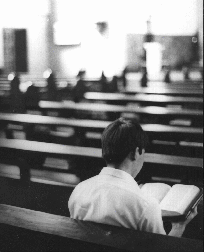 |
|
|
|
|
|
 |
|
|
|
|
|
|
|
|
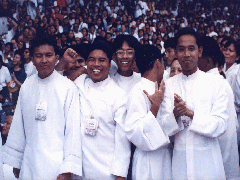 |
|
|
|
|
|
|
|
|
"Of special importance is the capacity to relate to others. This is truly fundamental for a person who is called to be responsible for a community and to be a 'man of communion'. This demands that the priest not be arrogant, or quarrelsome, but affable, hospitable, sincere in his words and heart, prudent and discreet, generous and ready to serve, capable of opening himself to clear and brotherly relationships and of encouraging the same in others, and quick to understand, forgive and console." (Pastores Dabo Vobis, 43)
|
|
|
|
|
|
|
|
 |
|
|
|
|
|
|
|
|
"To be pastorally effective, intellectual formation is to be integrated with a spirituality marked by a personal experience of God. In this way a purely abstract approach to knowledge is overcome in favor of that intelligence of heart which knows how to 'look beyond,' and then is in a position to communicate the mystery of God to the people." (Pastores Dabo Vobis, 51)
|
|
|
|
|
|
|
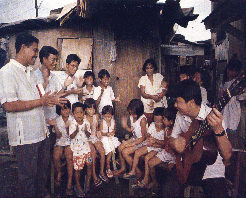 |
|
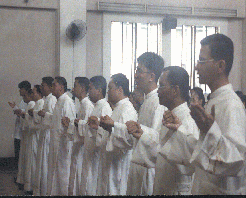 |
|
|
|
|
|
|
|
|
"The whole formation imparted to candidates for the priesthood aims at preparing them to enter into communion with the charity of Christ the good shepherd. Hence, their formation in its different aspects mush have a fundamentally pastoral character. Hence, they should be trained for the ministry of the word, the ministry of worship and sanctification, and the ministry of the shepherd, that they may know how to represent Christ to humanity, Christ who 'did not come to have service done to him but to serve others and to give his life as a ransom for the lives of many' (Mk. 10:45; Jn. 13:12-17). The Council text insists upon the coordination of the different aspects of human, spiritual and intellectual formation. At the same time it stresses that they are all directed to a specific pastoral end. This pastoral aim ensures that the human, spiritual and intellectual formation has certain precise content and characteristics; it also unifies and gives specificity to the whole formation of future priests. Apostolate works, catechetics and seminars outside are some of the programs in line with the Pastoral Formation." (Pastores Dabo Vobis, 57)
The sum total of a seminarian's training is for him to grow in his identification with Jesus Christ. In response to grace, he builds up his commitment- to personal sanctification, to discernment of his vocation, to constancy in prayer, to diligence and competence in studies, to pastoral involvement. In the final years prior to ordination, he sees himself and his mission as "animated by the love of God, entrusted to the maternal care of Mary, committed to a life of prayer and discernment grounded in the Mass, to self-discovery and self-acceptance, to simplicity, chastity, humility and docility, to study and work, to the appreciation of faith."
|
|
|
|
|
|
|
|
|
|
|
|

|
|
|
|
|
Do you want to become a diocesan priest? Join us! Click here!
|
|
|
|
|
|
|
|
|
|
|
|
|